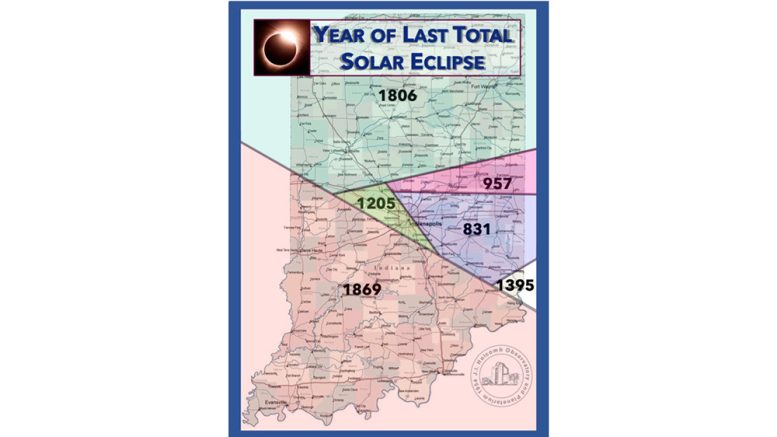By RYAN MORSE
WISH-TV | wishtv.com
April 8 will be a day Hoosiers remember for the rest of their lives if the skies can remain mainly clear. Shortly after 3 p.m., many will plunge into darkness as the moon blocks the sun.
Solar eclipses are rare, and we are very lucky to have the path of totality passing right over Indiana. Since 1900, the United States has only seen 12 total solar eclipses pass any portion of the country.
Brian Murphy, who is a professor of physics and astronomy at Butler University, said, “Some portions of Indianapolis, including Butler University, have not seen a total solar eclipse in nearly 1,200 years. So, that is why this is an important astronomical event. It is the Super Bowl of astronomical events.”
In the map, you can see many in Indiana have gone centuries without being in the path of totality. Our most recent eclipse in any point of the state was 1869.
A total solar eclipse occurs on Earth an average of once every 18 months. Over 70 percent of Earth is water, so getting an eclipse on land in an accessible spot is more uncommon. Taking it a step further, living in a place where the solar eclipse is occurring and not having to travel is extremely rare.
“Your odds of experiencing a total solar eclipse are once every 375 years,” Murphy emphasized. “So it is literally more than once than a lifetime event that’s happening.”
Also, it is worth noting that being in the path of a partial eclipse is not nearly as rare. Your chance of being in a partial solar eclipse is once every 2.25 years. Hoosiers will remember having that partial part of the eclipse while others experienced totality in August 2017.
It will be quite a bit until Indianapolis sees its next solar eclipse. That date will be Oct. 17, 2153, meaning this upcoming eclipse on April 8 will really be a once-in-a-lifetime event.

